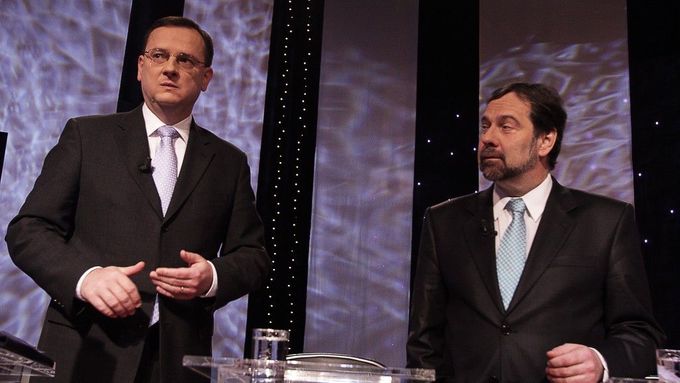For the Czech Republic's three-member center-right government, the year 2011 was marked by another series of internal disputes, most of which were linked to Public Affairs, the coalition's smallest - and most troublemaking - member.
In January 2011, one month after the "Christmas" government crisis, the internal tension erupted once again - this time over the appointment of a new police president. In April, another twist came after a serious internal crisis in Public Affairs resulted in the party losing three ministers, and the party's parliamentary club losing three deputies.
Another blow to the stability of the government came when Deputy PM Radek John - heading the government's anti-corruption efforts - resigned from his post, citing a lack of support from the PM as the reason. John is also the chairman of Public Affairs.
While most of this year's political problems in the Czech government has been linked to Public Affairs, even the largest member of the coalition, Civic Democratic Party (ODS), had its share.
In December, the Czech Culture Minister resigned amid corruption allegations.
Largest strike in 20 years
However, the Czech Republic's political turmoil should come as no surprise. Aktualne.cz's analysis showed that since 2003, the Czech Republic has had eight governments and six prime ministers - more than any other country in the EU.
In addition to internal tensions, the government also had to face external challenges - mainly from the opposition, but also from Czech labor unions which in June staged what was probably the largest strike in the last 20 years, as a protest against austerity reforms planned by the government.
In spite of all this, the government in 2011 went on with its reform agenda. In August it approved its important tax reform package.
Racial violence and diplomatic war
Another important issue of 2011 was growing racial tension in some underdeveloped parts of Northern Bohemian cities, with racial violence between some members of the local Roma minority and white majority.
Some interesting developments took place in the Czech Republic's relations with Ukraine and Russia. While the Czech-Ukrainian relations were strained by a diplomatic war, economic relations with Russia flourished in 2011. Czech investors, including the richest Czech, seized opportunities in the Russian market. At the same time, a Czech-Russian consortium got closer to a tender for reconstruction of the Czech Temelín nuclear plant, especially after a state visit of Russian President Dmitry Medvedev, who signed a number of trade agreements with his Czech counterpart Václav Klaus.
Corruption affairs
The year 2011, as every year in the Czech Republic, was also full of corruption affairs and allegations, including very high-profile ones. Aktualne.cz journalists managed to take photos of a group of managers of some key Czech companies arriving at the Prague Ruzyně airport from a golf trip to Dubai. The affair raised serious suspicions about some public contracts awarded to the companies in question.
Martin Roman unexpectedly stepped down as the CEO of ČEZ, a Czech energy giant. Czech Foreign Minister said that ČEZ had been financing Czech political parties - this allegation was eventually confirmed by another influential politician, František Bublan from the opposition Czech Social Democratic Party.
In addition, Czech police has been investigating Martin Roman's links to Škoda Plzeň, a company that had received hundreds of millions of euro in public contracts from state-owned ČEZ. Police suspects that Roman is the real owner of Škoda Plzeň, which moved its seat to Marshall Islands.
On 18 December 2011, former Czechoslovak and Czech President Václav Havel died, aged 75.
